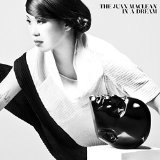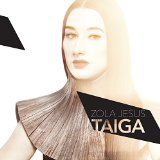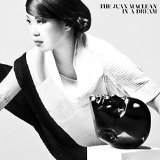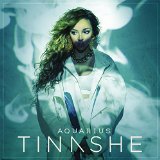An archetypal indie band of the type you hear less and less these days, Hospitality’s second album is a masterful example of restraint, space and structure. Instrumentals, vividly detailed middle eights and trumpet solos are all given ample breathing space. Never too precise or self -indulgent, Amber Papini sounds like a fallen it-girl spending her days and nights on the phone smoking in coffee shops and crashing on other peoples’ sofa-beds. An album that reveals more with each listen, Hospitality are both old fashioned and forward-looking in their execution of guitar, drums and the occasional synth pop.
SZA, Kelela and Kindness have all been responsible for building the momentum of the new slowed-down and sonically screwed with RnB genre that came out of the remains of classic Aaliyah and Brandy and Cassie’s massively influential and singular debut. All commendable in the own right, none of these have yet mastered the all essential ingredient of delectable and persistent melodies like Tinashe has on her sublime debut album, the most consistent and important RnB album from a female vocalist in the last couple of years.
 Azealia Banks – “Broke With Expensive Taste”
Azealia Banks – “Broke With Expensive Taste”
Her own worst enemy at times, but maybe that makes more sense now “Broke with Expensive Taste” has finally arrived in one piece and in the way Banks wanted it to. ‘I try all the cultures’ she sings over the appropriately tight and popping “Soda” and indeed she does; soca, hip-house, trap, surf-rock, UK garage and very deep house music all feature. The link to all of these styles is Banks herself; her inability to compromise and her keen ear have ensured her debut is one of the best within the genre, whatever genre that may be.
 The Juan Maclean – “In A Dream”
The Juan Maclean – “In A Dream”
It’s hard not to mentally tick off the many influences that bubble up whilst listening to The Juan Maclean’s third album. Dance and club music is unavoidably indebted to its past, there are over five decades of a rich, diverse history to get lost in but McLean wisely avoids pastiche and nostalgia and creates his own nocturnal fantasy. With the essential Nancy Wang’s deadpan disco queen vocals dominating two thirds of the album, the duo have created their most successful and exciting collection to date.
Not quite her masterpiece, so far that honour still falls upon 2011’s ground-breaking “Strange Mercy”. Annie Clarke’s first self-titled album is, following eleven months of getting-to-know-you time, probably her most strange and artful release so far. The original conceit is that it was going to be her most accessible and ‘pop’ album to date and yes, one of the songs does sound like a classic Madonna ballad. But tracks that start off as off-colour, other-worldly RnB end up somewhere completely unrelated, bruised and bashed 3 minutes later – and it works beautifully. A genuine superstar, St Vincent’s ‘St Vincent’ is one of the year’s brightest and most brutal releases.
 The objective Zola Jesus set herself for her fourth album was to face her own fears about how her love for pop music would eventually have to inform her work and what that might sound like. It is significant maybe that the oldest song here and the one that finally forced Jesus into the glare of potential mainstream and started the ball rolling, “Dangerous Days”, is also the purest pop song on “Taiga”. It has a brightness that contradicts its title, a brilliant pre chorus, an actual chorus which is only slightly less captivating and a sonic energy that’s slick and addictive and brings to mind the slightly more intricate and risky songs from Madonna’s mighty “Ray of Light” album.
The objective Zola Jesus set herself for her fourth album was to face her own fears about how her love for pop music would eventually have to inform her work and what that might sound like. It is significant maybe that the oldest song here and the one that finally forced Jesus into the glare of potential mainstream and started the ball rolling, “Dangerous Days”, is also the purest pop song on “Taiga”. It has a brightness that contradicts its title, a brilliant pre chorus, an actual chorus which is only slightly less captivating and a sonic energy that’s slick and addictive and brings to mind the slightly more intricate and risky songs from Madonna’s mighty “Ray of Light” album.
The remainder of Taiga is not really a pop record although it frequently aspires to be one. Soundscapes are stripped almost entirely of any of the glitch that featured on 2011’s “Conatus” or the muddy density on her brilliant breakthrough album “Stridulum II” and replaced by something that is undeniably big and rich but simpler and more concentrated than before. A lot of the songs have beautiful, powerful intermissions; it’s just that too frequently the melodies are lacking the strength to push these tracks to required level, the one which you presume she had in her sights. Dean Hurley co-produces with Jesus and is an odd choice given his primary job as David Lynch’s new sound man, responsible for producing both of Lynch’s inconsistent and naive solo albums, and hardly a name synonymous with making music that can be sung along to. There are references here to the Ryan Tedder meets Sia school of Beyoncé power pop on the crashing but dull “Lawless” and the Rihanna-phrased “Long Way Down” but neither songs would pass the pop queen’s test of a tune that hijacks relentlessly.
The more successful tracks, and “Taiga’” is the definition of a front-loaded album, happen in the first half. “Dust” has a woozy, avant r’n’b doo-wop swing which is hypnotising and commercially-minded and “Go (Blank Sea)” like Petula Clark, and hundreds after her, successfully sees Jesus pining for the eternal pop never-never land of “Downtown”. “Hunger” has a thrusting and bewildering attack of beats, brass and synths – at one point it’s hard to distinguish between the two- and a glacial, persistent string part and is exhilarating and sharply euphoric. “Ego” is a suspended hymn of considerable power where all of “Taiga”’s elements fall into place; a lucid and possessed vocal interrupted by sheets of brass that morph effortlessly into aching strings. The ongoing presence of strings and brass in particular bear out the theory that “Taiga” is more of a continuation of the stripped down “Versions” of last year then something you might hear in a bar. From here on in and midway through “Taiga”’s playing time the focus is lost, however, and gives way to repetition and mediocre tunes. “Hollow”, for example, attempts to salvage some drama and presence but is an oddly similar reimagining of the far superior “Hunger”.
Since the release of “Taiga”, Jesus has been remixed by the likes of The Juan Maclean and Diplo, a still relatively underground sophisticated pop-dance act, and the man rumoured to be producing the next Madonna album. Both artists have done commendable jobs in highlighting the hooks in what were admittedly already two of the album’s stronger songs (“Dangerous Days” and “Go”). Where their real strength lies, though, is in taking Jesus’ music to a demographic previously unaware of her and potentially initiating an interest to investigate further. This is where Jesus and “Taiga” stumble as the initial promise of something different and more accessible is never really delivered so new fans are unlikely to convert and current ones will be dissatisfied at the loss of the incredible depth and half-shaded mystery that permeated her earlier work. A good album still with some great songs but “Taiga” doesn’t quite provide the soundtrack that Zola Jesus commands and deserves, whether she continues to chase her big pop arrival remains to be seen but you feel that this isn’t it.
 ‘Flights, in the night’ sings Nancy Whang conspiratorially during a quiet portal in the impressively detailed “A Place Called Space” that opens The Juan Maclean’s third album proper. Nothing sums up Whang and Maclean’s manifesto quite as perfectly as that line. Alluding to a retro glamour which no longer exists and a promise of a decadent and clandestine other world where the only light is artificial and strobing. This line, better still if it were morphed into a song title, could have been uttered on any number of Donna Summer’s tracks which featured on her most essential, electronic and nocturnal albums made between 1977- 1979 and produced by Giorgio Moroder. As if to hammer this point home Whang has simultaneously released an EP under her own name which is a collection of Casablanca records cover versions, it includes a faithful interpretation of Summer’s slippery and melancholic “Working the Midnight Shift”. “In A Dream” is a record that may wear its influences heavily on its sleeve but the cluster of magnificent songs and the vocal dynamics honed between the two prevents it from falling into a potentially deep hole of nostalgia and tribute.
‘Flights, in the night’ sings Nancy Whang conspiratorially during a quiet portal in the impressively detailed “A Place Called Space” that opens The Juan Maclean’s third album proper. Nothing sums up Whang and Maclean’s manifesto quite as perfectly as that line. Alluding to a retro glamour which no longer exists and a promise of a decadent and clandestine other world where the only light is artificial and strobing. This line, better still if it were morphed into a song title, could have been uttered on any number of Donna Summer’s tracks which featured on her most essential, electronic and nocturnal albums made between 1977- 1979 and produced by Giorgio Moroder. As if to hammer this point home Whang has simultaneously released an EP under her own name which is a collection of Casablanca records cover versions, it includes a faithful interpretation of Summer’s slippery and melancholic “Working the Midnight Shift”. “In A Dream” is a record that may wear its influences heavily on its sleeve but the cluster of magnificent songs and the vocal dynamics honed between the two prevents it from falling into a potentially deep hole of nostalgia and tribute.
If their 2005 debut album was an accurate record of the post-electro clash, nihilistic and disco-damaged DFA early days and the follow up and homage of sorts to British synth pop and handbag house then this record is where the pair decide to reach back even further. There has always been a vivid and brattish clutch of songs that have been hard to ignore in The Juan Maclean’s back catalogue, screaming and shouting for attention and not fully formed. “In A Dream” has eliminated these kinds of distractions and is all the better for it; Nancy Whang is afforded full vocals on six of the nine tracks here and is having a ball in the process. Her voice is not that of a disco diva although frequently this is precisely what the sonics would appear to dictate. It has a flat and disinterested quality and still, somehow, considerable charisma, and Whang can interchange between dismal, withering betrayal and a warm optimism that dominates for example the gradually unfurling and uplifting ten minute closing track “The Sun Will Never Set on Our Love”. Tellingly this is their first album to feature just Nancy Whang as the cover artist, overshadowing a metallic bust of a physically absent Maclean.
“You Were a Runaway” has a choppy and to-the-point Grace Jones type pop structure. “Running Back To You” with its gorgeously padding synth swirls and reference to Imagination’s slinking 1980 hit “Body Talk” is the album’s only mid-tempo song and sees Whang softened but not entirely submissive. “Love Stops Here”, which may have the album’s strongest melody, puts Maclean upfront and sounds like a very good LCD Soundsystem song with washes of New Order guitar along with Whang’s glorious ‘do do do’ refrain popping up for the very last moments. “I’ve Waited for so Long” is a tight and confrontational “Don’t You Want Me”- styled trade-off between the two vocalists. It borrows the bassline from Cerrone’s “Supernature” but like so much of the material here the duo detail and layer the soundscape to the point where it isn’t pilfering but perfecting a sound that is, within the confines of this album, completely theirs.
Two of the most complete and satisfying songs, the aforementioned Moroder-indebted “A Place Called Space” and the penultimate track “A Simple Design”, both featuring a dominant Whang vocal, see The Juan Maclean finally solidify an effortless and endearing personality. Since “Less Than Human” the couple have spent a decade attempting to gel in a way that allows them both to share the lead, a hard feat indeed as Whang is not just a ‘front woman’ and neither is Maclean an invisible producer in the mould of, say, Goldfrapp. With Maclean cast in the role of an outsider and a muted and occasional vocalist to boot, you feel that he is now happier to concentrate on perfecting the world that surrounds the two and less inclined to push his voice to the front in a way that has read as self-conscious before. It is impossible to imagine him for example delivering the stand-off line ‘time after time, when what you’re hoping to find is not a simple design but a headache!’ from “A Simple Design” with the same brutish gusto as Whang does. Both roles are of equal importance and “A Place Called Space” sees The Juan Maclean arrive at their ultimate destination; confident, possessed and prepared to share it with us. We should think ourselves lucky.





